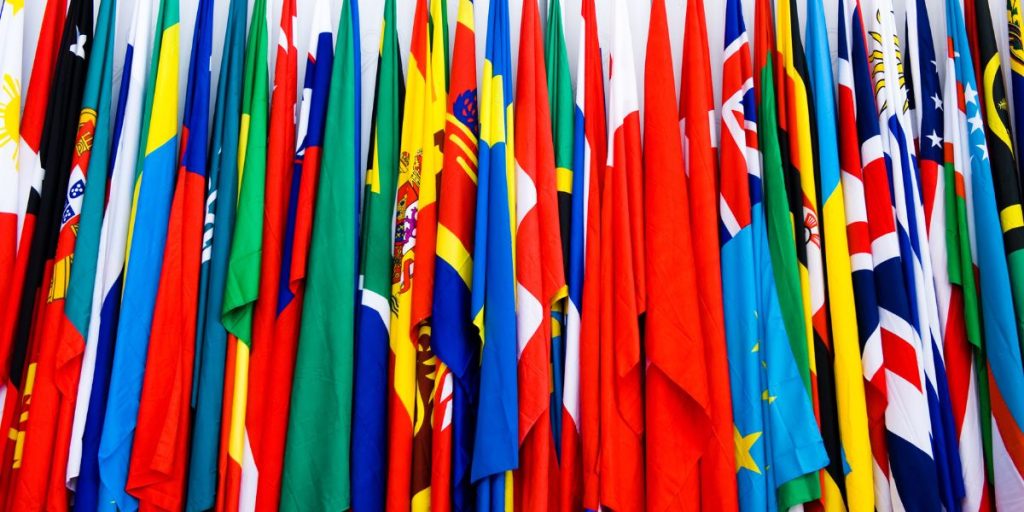The relationship between globalisation and the events industry is one of positivity and interdependence. Globalisation refers to the integration of individuals, businesses, and governments across the world, resulting in a shared global culture, politics, and economy, among other factors. This interconnectedness has had a significant impact on the events industry, as it has contributed to the growth and diversification of events worldwide. The events industry is a dynamic and vital contributor to the global economy, encompassing a wide range of activities that bring people together for various purposes, including business, entertainment, and cultural exchange.
Any significant changes in the event industry directly affect the global scenario, and this article is all about that. So, let’s look at some of the aspects of the event industry to understand its strong influence on the global condition. Before that, we will look at the importance of the event industry to understand the whole scenario better.
What is the Importance of the Event Industry?
The events industry has a far-reaching impact, enhancing the quality of life for individuals and communities worldwide. It plays a crucial role in the global economy and society, providing a platform for businesses, organisations, and individuals to connect, share ideas, and celebrate.
Here are some of the specific ways in which where event industry proves its importance-
- The events industry generates significant economic activity, creating jobs, driving tourism, and boosting local businesses.
- It facilitates cultural exchange and fosters social connections.
- The upgraded event ticket-selling system of the industry eases the options to connect to the events and makes attending any event a lot more convenient.
- It provides a platform for networking and collaboration among businesses and organisations.
- It helps to promote tourism and boost local economies by attracting visitors from around the world.
- Events promote education, research, and innovation.
- They enhance the quality of life for individuals and communities.
What is the Significance of Global Events?

Global events play a crucial role in promoting cross-cultural understanding and international collaboration, bringing together people from diverse backgrounds and regions. Global events are like magnets, attracting people from all corners of the world to celebrate and engage in cultural exchange.
Worldwide events offer a platform for showcasing different cultures, promoting tourism, and fostering economic development. Global events such as international trade shows, sports events etc. are major drivers of economic activity, generating significant revenue for host countries and boosting local businesses.
In addition to their economic impact, global events also promote global citizenship, as they provide opportunities for people to come together, learn from each other, and celebrate their shared humanity. Global events are a powerful tool for promoting peace, diplomacy, and international cooperation, and they play a vital role in shaping the global narrative and promoting positive change.
What is an example of a Global Event?
One example of a global event is the Olympic Games, which brings together athletes and spectators from countries around the world to compete in various sports and celebrate global unity and cooperation. Another example is the World Economic Forum, which gathers influential leaders and thinkers from across the globe to discuss and address pressing global issues such as climate change and economic inequality.
Impact of Globalisation of Culture on the Events Industry

The globalisation of culture has transformed the events industry, providing opportunities for cross-cultural exchange and innovation. As cultural boundaries continue to blur, the events industry has evolved to meet the demands of a more diverse and inclusive audience. Here are some of the influenced fields are-
Food Consumption:
With the rise of globalisation, people are exposed to new cuisines and flavours from around the world. This has led to an increasing demand for diverse food options at events, as people seek to explore and celebrate different cultures through their cuisine. Event planners are now incorporating locally sourced and sustainable food options to cater to this demand.
Dressing Code:
The globalisation of culture has led to a more relaxed approach to fashion at events, as traditional dress codes are fused with modern trends. Event attendees now have more freedom to express their personal style, resulting in a more diverse and inclusive approach to fashion. Event planners are incorporating sustainable and ethical fashion choices, responding to the growing demand for eco-friendly options.
Communication:
The escalation of digital technology and social media has transformed how people communicate and connect at events. Globalisation has resulted in an increased need for multilingual support and innovative communication tools to bridge language barriers. Event planners are now incorporating real-time translation and social media engagement to enhance the overall attendee experience.
Lifestyles:
The globalisation of culture has resulted in a more diverse and inclusive approach to lifestyles and values. This has led to an increased demand for events that cater to different lifestyles and needs, such as wellness and eco-friendly events. Event planners are now incorporating sustainability initiatives and wellness programs, responding to the growing demand for events that prioritise health and wellness.
Impact of Social Media in the Events Industry on Globalisation

Social media has had a significant impact on the events industry and has played a crucial role in the process of globalisation. If you are wondering how here is a list for you-
Marketing and Promotion:
Social media has revolutionised the way events are marketed and promoted. Event planners can now leverage social media platforms to reach a global audience and promote their events more effectively. Social media platforms like Facebook, Twitter, and Instagram allow event planners to create and share event details, photos, and videos, attracting a broader audience and promoting globalisation.
Attendee Engagement:
These platforms have also helped enhance attendee engagement during events. Attendees can use social media platforms to share their experiences, photos, and videos, creating a buzz and attracting more attention to the event.
Networking:
Social media has also facilitated networking among attendees and industry professionals. Event planners can create groups or communities on social media platforms, allowing attendees to connect, share ideas, and collaborate.
Feedback and Evaluation:
It has also made it easier for event planners to collect feedback and evaluate their events’ success. Attendees can use social media platforms to provide real-time feedback, share their opinions, and rate the event. This can help event planners make improvements and create more engaging and inclusive events, encouraging globalisation.
Impact of Environment in the Events Industry on Globalisation

The events industry has a significant impact on the environment, and this impact, in turn, affects globalisation. Here are some of the ways in which the environment in the events industry impacts globalisation:
Increased Transport of Goods
The events industry requires a lot of resources, including food, decorations, and materials. This often leads to increased transport of goods, across borders associated with globalisation, as it can lead to increased economic activity and global trade. But on the other hand, this growth affects the environment by contributing to air pollution, greenhouse gas emissions, and global warming.
Economic Specialisation
Economic specialisation refers to the practice of countries focusing on producing goods and services that they are most efficient at producing. This can lead to increased globalisation as countries trade with each other to obtain the goods and services they need. However, economic specialisation can also have negative impacts on the environment, as countries may focus on producing goods that are not sustainable or contribute to environmental degradation.
Decreased Biodiversity
The events industry can have a negative impact on biodiversity, particularly when events are held in natural environments. The construction of event infrastructure and the presence of large crowds can disrupt natural habitats, leading to a decrease in biodiversity. This has implications for globalisation, as it can lead to a loss of cultural and ecological diversity.
Increased Awareness
The events industry can also have a positive impact on the environment by raising awareness of environmental issues and promoting sustainable practices. Events that focus on environmental sustainability and conservation can educate attendees and inspire them to act to protect the environment. This can have positive implications for globalisation as people become more aware of the interconnectedness of the global environment and the need to work together to address environmental issues.
Impact of Globalisation of Politics on the Events Industry

The impact of the globalisation of politics on the events industry is a complex and multifaceted issue that has significant implications for the events industry. Here are some of the ways in which the globalisation of politics impacts the events industry:
Spread of New Concepts
The globalisation of politics has led to the spread of new concepts and the promotion of human rights. This has influenced the way events are organised, making them more inclusive, diverse and focused on promoting equality and social justice.
Reaching Global Connections
As politics has become more globalised, events have become more interconnected and international in nature. Events are now designed to reach a global audience, creating new opportunities for cultural exchange, collaboration and business.
Formation of International Institutions
The globalisation of politics has led to the formation of international institutions such as the United Nations, World Health Organisation, and World Trade Organisation. These institutions have influenced the way events are planned and executed, with events now being used as a platform for promoting international cooperation, dialogue, and diplomacy.
Imbalance of Power
The globalisation of politics has created an imbalance of power, with some countries and organisations dominating the global stage. This has presented challenges in the events industry, such as ensuring diversity and inclusion, addressing social and economic inequality, and promoting sustainable development.
What is the Trend in the Events Industry?

If we look at the post-COVID-19 phase, the year 2022 when the event industry started coming back to its natural game, we can find these trends to be a highlight of the year-
- One of the prevailing trends in the events industry of 2022 is the transformation of events from just a branding tool to a vital channel that drives business revenue and pipeline. Businesses now recognise that events are not one-off occurrences, but rather require consistent investments of time, resources, and funding to yield maximum impact.
- The primary challenge that 62% of marketers face in the events industry is generating demand for events. So, focusing on increased visibility and demand was a big challenge for this year.
- An emerging trend in the events industry of 2022 is the widespread use of multiple tools to manage events. 50% of B2B marketers are engaging in at least 4-5 different tools to run an event.
- paraphrase and write it like an event industry trend of 2022 as each event format brings its own advantages and value to attendees.
Now if we look at the half-passed part of 2023, in the case of event industry trend it can be observed that-
- The ability to deliver high-quality events while keeping costs in check will be a crucial factor in the success of the event industry in 2023.
- Instead of using multiple-point solutions across the event lifecycle, there will be a focus on integrating various tools and technologies to create a unified system. This will simplify the management of events and help in better data analysis and decision-making this year.
- A majority of marketers, 84%, consider hybrid events as a fundamental component of their event strategy. With the advent of event ticketing platforms, managing hybrid events, which used to require significant tech support, has become easier, allowing for streamlined management of speakers, attendees, and sessions across both physical and virtual spaces. This is expected to be a significant trend in the events industry in 2023.
In conclusion, the events industry has undergone significant transformation over the years, driven by various factors such as globalisation, technology, and changing consumer behaviour. As we look towards the future, it is clear that the industry will continue to evolve and adapt to meet the changing needs of businesses and consumers alike. From the unification of event tech stacks to the growing popularity of hybrid events, 2023 promises to be an exciting year for the events industry. By staying on top of the latest trends and technologies, businesses can leverage the power of events to drive pipeline, revenue and growth. So, let’s embrace the changing landscape and make the most of the opportunities that lie ahead!




